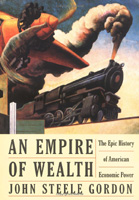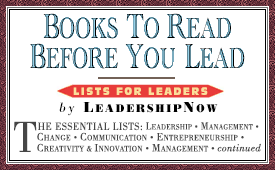
|
 |
An Empire of Wealth: The Epic History of American Economic Power John Steele Gordon 
Format: Paperback, 496pp. ISBN: 9780060505127 Publisher: Harper Perennial Pub. Date: Reprint edition October 25, 2005 Average Customer Review: For Bulk Orders Call: 626-441-2024 Description and Reviews From The Publisher: Throughout time, from ancient Rome to modern Britain, the great empires built and maintained their dominion through force of arms and political power over alien peoples. In this illuminating work of history, John Steele Gordon tells the extraordinary story of how the United States, a global power without precedent, became the first country to dominate the world through the creation of wealth. The American economy is by far the world's largest, but it is also the most dynamic and innovative. The nation used its English political inheritance, as well as its diverse, ambitious population and seemingly bottomless imagination, to create an unrivaled economy capable of developing more wealth for more and more people as it grows. But America has also been extremely lucky. Far from a guaranteed success, our resilient economy continually suffered through adversity and catastrophes. It survived a profound recession after the Revolution, an unwise decision by Andrew Jackson that left the country without a central bank for nearly eighty years, and the disastrous Great Depression of the 1930s, which threatened to destroy the Republic itself. Having weathered those trials, the economy became vital enough to Americanize the world in recent decades. Virtually every major development in technology in the twentieth century originated in the United States, and as the products of those technologies traveled around the globe, the result was a subtle, peaceful, and pervasive spread of American culture and perspective. An Empire of Wealth is a stirring epic that mirrors the remarkable trajectory of America's history. Featuring a cast of entrepreneurial icons that includes John D. Rockefeller, Henry Ford, and Bill Gates, this is a story full of euphoria and disaster, daring and timidity, great men and utter fools. From the Revolution to the Great Depression to the Internet era and the turn of the millennium, John Steele Gordon captures as never before the true source of our nation's global influence. Reviews The word "epic" in the subtitle is a tip-off that instead of a critical history of the American economy, this book is a celebration of it. Nothing wrong with that, especially when the tale's told breezily and accurately. In fact, Gordon (The Scarlet Woman of Wall Street) notes the many stumbles and the frequent foolishness and corruption that attended the nation's rise as an economic powerhouse. The larger story of success is, in fact, an extraordinary one. The trouble is that the American economy, like every other, bends much out of shape. It has always provided opportunity but always with too much inequality. A full history of the American economy would take this into consideration—in the past as well as the present, and Gordon's doesn't. Also, his book sometimes wanders off into irrelevant subjects, like the origins of the computer, but his grasp of the larger picture is sure and his prose bright. His chapter on Northern and Southern Civil War finances is a model of its kind. Those seeking an introduction to the general history of American economic power will find few better places to start, as long as they keep in mind that the nation's economy is not perfect, its benefits not unalloyed and its future domination of other economic powerhouses by no means assured. —Publisher's Weekly, Copyright © Reed Business Information, a division of Reed Elsevier Inc. All rights reserved. More than a century ago, the steel titan Andrew Carnegie declared in his book Triumphant Democracy: "The old nations of the earth creep on at a snail's pace; the Republic thunders past with the rush of the express. The United States . . . has already reached the foremost rank among nations, and is destined soon to outdistance all others in the race. In population, in wealth, in annual savings, and in public credit; in freedom from debt, in agriculture, and in manufactures, America already leads the civilized world." No historian, in Carnegie's day or since, has denied America's extraordinary economic growth, but interpreters have not agreed on the benefits and costs of that growth. Nor have they agreed on what constitutes the most important lesson of America's economic development. When they approach history's altar, some have argued that the lessons are to be found in the fire, from the raging engine of economic growth. Others have taken their lessons from the ashes, from the suffering of those singed in the process. In An Empire of Wealth, John Steele Gordon, an accomplished historian of American business and a columnist for American Heritage magazine, puts the focus back on the fire, and he does so with verve and passion. His absorbing popular history recounts the triumphal saga of a collection of colonies that, having broken free of Europe's constricting hand, went on to convert a vast patrimony of virgin forests and generous natural resources into the world's most powerful economic system -- succeeding so wildly that today, with 6 percent of the world's land and population, the United States boasts "close to 30 percent of the world's gross domestic product." Gordon is a knowledgeable and relentlessly optimistic chronicler, relating with great panache how America's turn toward liberty, growth and innovation produced wonders of synergy. He captures well the epiphanies of inventors, industrialists and speculators as these legendary self-made men spun together the fibers of American dominance. And he vividly recreates the climate of exigency that made America's wars such powerful economic catalysts. An Empire of Wealth offers a Promethean narrative of America's rise to economic dominance. Gordon's account is both highly readable and enlightening. With a near-perfect ear for the apt quote and the telling phrase, Gordon marches the reader through America's seminal economic accomplishments -- from Alexander Hamilton's financial plans to the Erie Canal, the cotton gin and the piecemeal nurture of a blossoming economy; to the rise of steam energy, transatlantic shipping, the railroad, the telegraph, and the mega-businesses of petroleum, electrical energy, steel and automobiles; and finally to the Cold War boom and the Internet. Before the reader's eyes, an undeveloped land dotted with scattered farms, primitive roads and modest local markets is transformed into a Hamiltonian system of robust expansion, audacious investment and global reach. Unfortunately, however, this narrative of primary colors and bold strokes lacks nuance and contrasting detail. As inventions and breakthroughs carry the story forward, Gordon downplays the unsavory aspects of a more textured American economy and swiftly dispatches more complicated issues like new economic departures. As a result, his conclusions are modestly scaffolded, offering more a point of view than a historical analysis. While Gordon informs us that many "captains of industry" were impressive philanthropists, he does little to explain how this benevolence coexisted with brutal business practices and labor policies. Fascinated by the results of wealth production, he pays but passing attention to the circumstances under which this wealth was produced. He is satisfied to suggest that things were certainly worse elsewhere. No doubt they were, but these important issues bear profoundly on the story at hand. After all, concern about economic justice led Americans to make crucial modifications in laissez-faire capitalism in the hopes of adjusting an irregular and sometimes manipulated market. Indeed, we read so little about business excesses that we are unprepared for Gordon's mention of the federal government's 1907 offensive against the Standard Oil petroleum monopoly. He concludes his discussion of the oil cartel's dissolution by noting an irony: The breakup made John D. Rockefeller much wealthier. Does this tell us something important? Gordon fails to ponder the question. Elsewhere, he suggests that Rockefeller, J.P. Morgan and Andrew Carnegie fought federal regulation because they came of age in an era when the government was easily corrupted -- as if the Gilded Age business community was more trustworthy. The issue is not trust but something deeper, which Gordon simply lets slide. "The trouble with capitalism is capitalists," Herbert Hoover once said. "They're too damn greedy." Gordon quotes Hoover's chestnut but devotes too little thought to the hazards of unregulated profit motive. Gordon's enthusiasm also leads to some debatable conclusions, especially in the closing pages of his account. The calamitous recent decline in technology stocks, which set off a round of scandals that laid bare some of the shoddiest business practices in history, is dismissed as a "normal, if considerable, stock market correction." He lauds the computer and the Internet as the "most potent weapon against tyranny since the concept of liberty itself." In fact, this technology has been used for profound evil even as it has also promoted the freedoms we cherish. Gordon has a tendency to exempt technological progress from searching scrutiny. That laissez-faire confidence is worrisome. He closes his book with the al Qaeda attack on America on Sept. 11, 2001, blithely reassuring his readers that wars are won by money and that no one has ever had more than the United States. Would that it were all so simple. —Reviewed by Thomas Kessner Copyright 2004, The Washington Post Co. All Rights Reserved.
About the Author John Steele Gordon is a columnist for American Heritage and the author of A Thread Across the Ocean, The Great Game, Hamilton's Blessing, and The Scarlet Woman of Wall Street. His writing has appeared in the New York Times and the Wall Street Journal. He lives in North Salem, New York. Find Items On Similar Subjects |
|

The Essential Lists BOOKS TO READ BEFORE YOU LEAD 
Grow Your Leadership Skills NEW AND UPCOMING LEADERSHIP BOOKS 
Classic Leadership Books BOOKS TO READ BEFORE YOU LEAD |
 |
| ||
 | © 2019 LeadershipNow™ All materials contained in https://www.LeadershipNow.com are protected by copyright and trademark laws and may not be used for any purpose whatsoever other than private, non-commercial viewing purposes. Derivative works and other unauthorized copying or use of stills, video footage, text or graphics is expressly prohibited. |
||